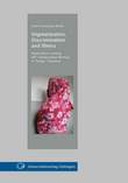Explore

Stigmatization, Discrimination and Illness
“She was given her own plate, her own cup, everything of her own, even when she just touched a cloth then nobody wanted to touch it again.” (Halima, HIV-seropositive) The book sheds light on the profound influence of an HIV-seropositive diagnosis on the lives of women and their social environment in the United Republic of Tanzania. The author, a medical doctor and social anthropologist, tells the story of six Tanzanian HIV-seropositive women, focusing on their negotiation and perception of illness and disease. Furthermore, the high levels of discrimination and stigmatization in the context of HIV-seropositivity that they experience are presented in detail, weaving together the impacts of an HIV-seropositive diagnosis with results analyzed both from a Medical Anthropology and Public Health perspective. Despite a new era of antiretroviral treatment, available in Tanzania free of cost, that has given cause for hope in a change in how the disease is perceived, the book impressively underlines that being HIV-seropositive remains a great challenge and heavy burden for women in Tanzania.
This book is included in DOAB.
Why read this book? Have your say.
You must be logged in to comment.
Rights Information
Are you the author or publisher of this work? If so, you can claim it as yours by registering as an Unglue.it rights holder.Downloads
- 140 - pdf (CC BY-SA) at OAPEN Library.
Keywords
- Discrimination
- HIV
- HIV/AIDS
- Infection
- Medical anthropology
- medicine
- Medicine: General Issues
- Personal & public health
- Public Health
- Public health & preventive medicine
- Serostatus
- Social Environment
- Society & Social Sciences
- Tanga
- Tanzania
- thema EDItEUR::J Society and Social Sciences
- thema EDItEUR::M Medicine and Nursing
- thema EDItEUR::M Medicine and Nursing::MB Medicine: general issues::MBN Public health and preventive medicine::MBNH Personal and public health / health education
- Women
Links
DOI: 10.17875/gup2013-289Editions

